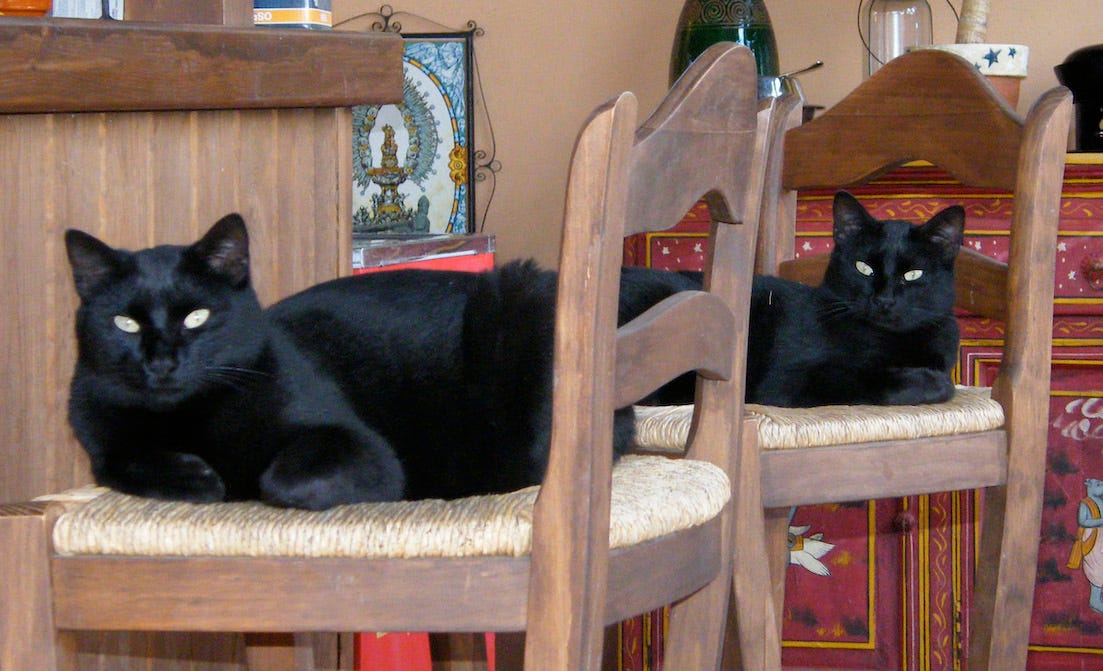My recent Not in the Script newsletter about building a bar in Spain, frequented by two know-it-all black cats*, has inspired a welcome contribution from a rising star in the world of historical fiction, Fiona Forsyth. As it happens, she knows a heck of a lot about ancient Rome and as you’ll see from my brief review of Blood and Shadows which you can buy on the link below along with a few special offers on my books.
Over to Fiona…
Nunc est Bibendum: So wrote the poet Horace and if anyone knew when the time for drinking should be, it would be him. Throw a stone at his collection of odes, and the odds are good that you’ll hit a poem with wine in it. Horace is good at celebrating, and wines thread through his poems, their names a poetry all of their own – Falernian, Mamertine, Calenian, Methymnaeum…
Less poetic would be the look on the face of a modern wine drinker on sampling Horace’s drink, for tastes have changed. Hugh Johnson in his “History of Wine” breaks the bad news – the Golden Age of Rome liked its wine sweet and diluted with water. Warm water. Sometimes, even, with seawater.
Honey wine was common, spiced wine everywhere. Picatum was a wine with a hint of pitch to it, maybe from the way the wine-jar was sealed with pitch. And that was not all. A quick glance through Pliny the Elder and it turns out that some people put lime (as in powdered stone, not the fruit) in wine. Why, one can only imagine. P the E does not approve, thank all the gods.
The cookery book that comes down to us as being the work of chef Apicius recommends that you add pepper to your honey wine, and there is even a recipe for wormwood wine, which sounds so horrible I shan’t tell you anything else about it. But I shall finish with a recipe from Apicius which is written so beautifully that even in translation it becomes a “found” poem:
The tips of rose petals, with their pale bases torn off,
sewn with linen and plunged into wine.
Seven days in wine.
After seven days lift the rose out of the wine,
and replace with fresh,
allowing the new petals to rest in the wine.
Seven days in wine.
Remove the rose.
After a third time,
(seven days in wine)
take out the rose and strain the wine.
When you come to drink, plump out the rosiness with honey.
Take care to pick the rose when fresh and dry of dew.
PS. You can do the same with violets.
Fiona Forsyth accepts no responsibility if anyone is so foolish as to try any of these strange concoctions.
* The cats names: Achilles and Spartacus. Appropriate for the Forrest household.
Blood and Shadows
Fiona’s latest novel, Blood and Shadows, follows the intriguing story of three young men, including Horace, two of whom are suffering PTSD following the horrible Battle of Philippi. She weaves her tale through the ensuing years of the effect of civil war on all three and their families. It’s a friendship tested by the political tensions that forged the Empire, delightfully filled with thorough research and knowledge of the period – lifestyle, writing, wine-making (with not a little ‘nunc est bibendum’ carousing) and travel among the highlights. But there are inevitable tensions. This not an account of the cut-and-thrust of war, rather a study of its aftermath and the effect it has on young lives. A story for our times. There’s murder, mystery and intrigue, and an appropriate twist that underscores the author’s fabulous grasp of this period in history. I highly recommend.
BARGAINS…
Snap up four 99p/99c kindle offers in the next 2 days
Sea of Flames: Meet the plucky, crazy crew of a Greek warship who have sworn vengeance on Mark Antony for murdering the captain's father... in the latest gripping novel set in the first century BC.
Libertas: "A fast-moving tale of fortitude, survival and eventual retribution told against the background of Rome's bloody civil war." - Douglas Jackson, author of the best-selling Gaius Valerius Verrens series
Agents of Rome – The Complete Campaigns: The whole story about Agrippa's spy network and the reluctant exploits of retired centurion Titus Villius Macer in Rome’s momentous war against the pirates of Sicily.
Line in the Sand: The story of David & Goliath as it might have been before the religious scribes got to work. "Adds blood, history and humanity to the classic tale" - Richard Foreman, author of Spies of Rome series.











Brilliant article - and we have LOTS of rose and their petals just now. Must just nip down to Sainsburys for the lime, pitch, etc...
Wow, you packed a lot in there. I feel fully informed about Roman wine, and adrift in a sea of excellent Roman fiction bargains.